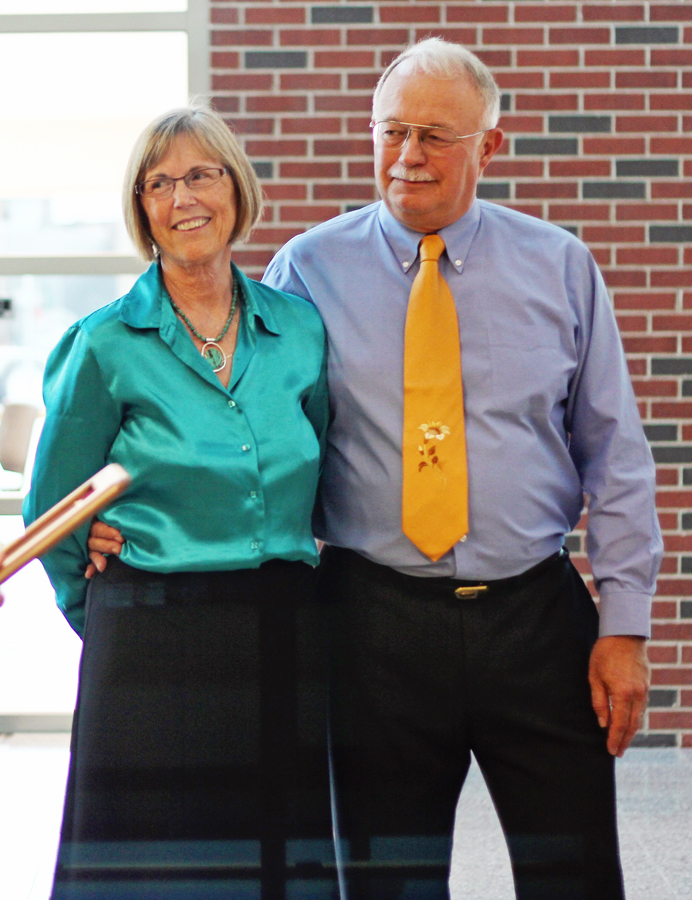An Interview with Sandy Monroe:
Director of University Undergraduate Advising
By Danielle Gilbert and Jennifer Radecki
Sandy Monroe’s connection to Purdue was forged early. A daughter of Seymour, IN farmers, she sought out the diversity and opportunity she wasn’t receiving at a small Chicago university by transferring to Purdue. The change afforded her access to excellent advising and experiences, culminating in the opportunity to be the first student from Purdue to complete an Indiana University-sponsored student teaching semester on a Navajo Indian Reservation. There she learned what it was like to be a minority, how to fully respect another’s culture, and what the 24/7 lives of her students really entailed. Her commitment to teaching was solidified and she graduated with a B.A. in Social Studies Education.
Afterwards, Sandy dove into a Purdue graduate degree in counseling (College Student Personnel). While completing her degree, she served as the “house mom” for Shoemaker Cooperative. This experience brought her into contact with wonderful mentors at the Office of the Dean of Students (ODOS) who encouraged her professional development, such Bev Stone, Barb Cook, Betty Nelson, and Linda Ewing. She transitioned to a full-time generalist counselor position with ODOS where she stayed for 10 years, continuing to advise co-operative housing through what is now called Student Activities and Organizations.
ODOS is also where she met her husband of 32 years, Jim Westman, who recently retired as the Director of the Purdue University Student Health Center (PUSH). To have both spouses working in the student affairs field is almost ideal, she said, because serving students is “a lifestyle and not just an 8 to 5 job” – a commitment they both understood. Over time, Sandy held varied positions in the Office of the Dean of Students. As an Associate Dean of Students, she served as the director of the On-Call Team to assist students in crisis. Later, as the Assistant Vice President for Student Affairs, she led the Behavioral Intervention Team. Her career so far has allowed her the joy of “[being] invited to be a part of students’ lives” and to affect them positively.
At the time of our interview with Sandy, she had been the newly-minted Director of University Undergraduate Advising for a grand total of 8 weeks. The position was the result of a Foundations of Excellence (FOE) recommendation encouraging a “unified academic advising focus,” with a “central point person” representing academic advising at the highest levels. This person would be a “centralized resource responsible for advisor advocacy, as well as best-practice review.” Sandy hopes that the creation of this position will bring visibility to the importance of academic advising in the undergraduate experience.
Sandy believes that academic advising is a student’s introduction to the higher education experience and it is important for that student to establish a one-to-one advisor connection early. Advisors can challenge students to think critically about their personalities, interests, goals, and the different worldviews they are experiencing. In her interaction with advisors, she has always been constantly impressed with what we do, our hard work, and our commitment to students and to the Purdue community at-large.
Sandy feels she has made good progress in her work with the Academic Advisor Project, which focused on the restructuring and standardization of academic advising positions. A task bank, created by a committee of academic advisors and advising directors, was implemented to assist in delineating new advising levels. Career ladders within each level will follow. A new standard for student to advisor ratio has been set (at 225:1) and new advisor hiring has been proposed to move this goal toward fruition. Throughout, Sandy has been representing advisors at campus-wide committee meetings.
Sandy feels that our advising community’s greatest challenges are to obtain recognition of, and respect for, our profession and our accomplishments. Collecting student feedback, continuing to be involved in student-related projects, committees, and programs, and actively participating in professional development opportunities are just a few ways for us to address these challenges. Ultimately, advising needs to remain student-focused and centered on continuing to assist and improve our services to them.
Positive changes for advising are just beginning. Sandy would love to hear advisors’ ideas for continued improvements, whether it’s through e-mail, during her attendance at a staff meeting, or through an informal talk while returning from an advising event. Her e-mail is skmonroe@purdue.edu and her phone number is 494-5779. Meetings can also be set by calling Julie Wise, her administrative assistant, at 496-2690.
